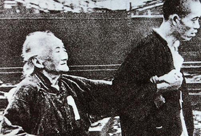 Fighters of Lanzhou MAC in confrontation training
Fighters of Lanzhou MAC in confrontation training
 3D printing to trigger third industrial revolution
3D printing to trigger third industrial revolution
 Top 10 brands that win rich women's hearts
Top 10 brands that win rich women's hearts
 Deng Xiaoping: 'I have a clear conscience all my life'
Deng Xiaoping: 'I have a clear conscience all my life'
 Xi Jinping: 'The people are our strength'
Xi Jinping: 'The people are our strength'
 Amazing cliff diving in cold winter
Amazing cliff diving in cold winter
 Enjoy Sochi 2014 in slow motion
Enjoy Sochi 2014 in slow motion
 University student sentenced to death for poisoning roommate
University student sentenced to death for poisoning roommate
 Chinese lunar New Year celebrated in San Francisco
Chinese lunar New Year celebrated in San Francisco
BEIJING, March 5 -- The newly revealed 12.2-percent increase of Chinese military spending to 132 billion U.S. dollars in 2014 has unsurprisingly met with an immediate outcry of "concerns" and "worries" from certain countries.
No sooner had Beijing's new defense budget gone public than some foreign officials and analysts jumped out to cast a false color on it and hype the "China threat" theory.
Both the head of the U.S. Pacific Command, Adm. Samuel Locklear, and Japan's chief cabinet secretary, Yoshihide Suga, pointed the finger at what they branded as a lack of transparency in China's defense outlays.
Locklear even cited China's "ambiguous" territorial claims in South China Sea and its establishment of an air defense identification zone over East China Sea to accuse Beijing of complicating the security environment.
Rory Medcalf, an analyst at the Lowy Institute for International Policy in Sydney, was quoted by Reuters as describing the increase of China's defense budget as "worrying news for China's neighbors, particularly for Japan." Such "concerns" and "worries" are unfounded and misplaced, and Locklear's accusation that China is complicating the security situation amounts to a gross perversion of truth.
First of all, it is a history-proven basic international norm that every country needs a military budget that can meet its defense needs. For China, the size of the country and its roles as a key player in maintaining regional and global peace and as the largest personnel contributor to UN peace-keeping missions demand that its defense outlays be relatively high.
To portray China as a threat because of its relatively big military budget is nonsensical.
As a matter of fact, China's military expenses are still much lower than those of major foreign powers both in proportion to GDP and in per capita terms. Thus the latest uptick is nothing unusual.
What is of more fundamental importance is China's peace-oriented defense posture and its responsible and constructive approach to regional and global affairs, including disputes it is directly involved.
As Locklear said, the security situation in the Asia-Pacific, particularly East Asia, has indeed become increasingly complicated and volatile. But it is largely the United States and Japan, instead of China, that should bear the blame.
The mounting assertiveness of some South China Sea claimants emboldened by Washington's so-called re-balancing to the Asia-Pacific and the resurgence of Japanese radical nationalism are among the real major menaces to regional stability.
In actuality, a militarily stronger China will be a more robust ballast of regional peace and stability.
As a responsible, major stakeholder in the region, China needs sufficient strength to prevent hot-headed players from misjudgment and thus forestall conflict and war, so as to maintain a favorable environment for the socioeconomic development of all in the neighborhood.
Washington has repeatedly stressed that its "pivot" to Asia does not target China and it does not take sides in regional territorial disputes. But its words are not matched by its deeds.
Japan, for its part, has already become a recidivous troublemaker in the region and set the world's nerves on edge as increasingly rampant rightist elements attempt to deny history, sabotage the postwar world order and scuttle the pacifist constitution.
Thus it is Washington and Tokyo, instead of Beijing, that should explain to the world their military postures and intentions.
 Chaihe village, pure and peaceful fairyland in snow
Chaihe village, pure and peaceful fairyland in snow Belgians warmly welcome arrival of China's giant pandas
Belgians warmly welcome arrival of China's giant pandas Female marines receive tactical training in NW China
Female marines receive tactical training in NW China Blood memory: Nanjing Massacre in 1937
Blood memory: Nanjing Massacre in 1937 Top 10 pure beauties in showbiz
Top 10 pure beauties in showbiz British WWII veteran: I can't forgive Japan
British WWII veteran: I can't forgive Japan Tongban's dream of prosperity
Tongban's dream of prosperity Chinese frigate Yancheng holds drills in Mediterranean Sea
Chinese frigate Yancheng holds drills in Mediterranean Sea A visit to comfort woman's home in South Korea
A visit to comfort woman's home in South Korea Fairyland? Qingdao in sea of clouds
Fairyland? Qingdao in sea of clouds Top 10 most handsome faces in Asia in 2013
Top 10 most handsome faces in Asia in 2013 Female celebs with beautiful long legs
Female celebs with beautiful long legs Cat 'guardians' in Forbidden City
Cat 'guardians' in Forbidden City Large numbers of ancient coins excavated in Inner Mongolia
Large numbers of ancient coins excavated in Inner Mongolia Leisurely life beneath Zhonggulou, where time travels slower
Leisurely life beneath Zhonggulou, where time travels slowerDay|Week|Month